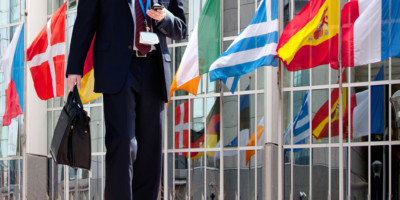-
德国
Germany – eSports gaining ever more significance
13 12 月 2017
- 知识产权
- 传媒
- 体育
Talking to clients five years ago the trend was clear, application was to be filed for the EU Trademark only, as it was faster, broader, in relation to the geographical scope cheaper and easier to handle. However as we experience now the EU trade mark has some downsides for which reason it is advisable to apply for a national trademark alongside the EU trade mark. And these are the reasons why:
Genuine Use
One of the main risks with trade marks is the fact that they must be used five years after registration. That use however must be genuine. According to the ECJ (C 149/11) “there is ‘genuine use’ of a trade mark where the mark is used in accordance with its essential function, which is to guarantee the identity of the origin of the goods or services for which it is registered, in order to create or preserve an outlet for those goods or services; genuine use does not include token use for the sole purpose of preserving the rights conferred by the mark. When assessing whether use of the trade mark is genuine, regard must be had to all the facts and circumstances relevant to establishing whether there is real commercial exploitation of the mark in the course of trade, particularly the usages regarded as warranted in the economic sector concerned as a means of maintaining or creating market share for the goods or services protected by the mark, the nature of those goods or services, the characteristics of the market and the scale and frequency of use of the mark.“
The problem which occurs from time to time is whether a trade mark used only in one member state or in a specific part of that member state is to be regarded as genuine use in the meaning of these ECJ findings. Whilst the ECJ (C 149/11) has not denied genuine use because of a territorial restricted use within one member state per se it still has not excluded that possibility and what is more has even given the national courts the decision making authority to assess “whether the mark in question is used in accordance with its essential function and for the purpose of creating or maintaining market share for the goods or services protected.“ Consequently a French court could decide that a use of a mark in Germany is insufficient for upholding a EU trade mark and thereby decide that the mark has to be deregistered. This reason alone provides for the necessity to have a national trade mark as plan B.
Counterclaim
When the plaintiff’s trade mark is a German trade mark, there is no possibility for the defendant to raise a counterclaim calling for a revocation of that plaintiff’s trade mark. The defendant has to file for an additional cancellation order before the German Patent and Trademark office. That additional cancellation proceeding however in general does not even bar the violation proceedings. So these will often be decided long before the cancellation proceedings in the last instance.
That is different when it comes to the EU trade mark. The EU trade mark can be declared void during (!) the violation proceedings by filing a counterclaim. Alternatively, the EU trade mark court hearing a counterclaim for revocation or for a declaration of invalidity may stay the proceedings on application by the proprietor of the EU trade mark and after hearing the other parties and may request the defendant to submit an application for revocation or for a declaration of invalidity to the Office. With the consequences that the violation proceeding is dead for ten years which it takes to pursue the cancellation proceedings through all instances.
Place of jurisdiction
The place of jurisdiction of a EU trade mark is limited to the place where the event which gave rise to the harm occurred (“Handlungsort”). The German trade mark however also provides for the place where the harm arose (‘Erfolgsort’) as place of jurisdiction. That however gives the plaintiff much more possibility to forum shop.
Statute of limitation
The EU trade mark does not provide a uniform statute of limitation. The ECJ (C 479/12) has decided that claims for injunctive reliefs become time-bared under the regulations of the national law. However in some case it can be very unclear which national law applies and therefore the same case can be seen differently in the different countries. When the plaintiff’s trade mark is a national trade mark the scope of application of the national statutes of limitation is clear and there are no further insecurities which are never to relish when have court proceedings.
The author of this post is Ilja Czernik.
These days, influencer marketing is an indispensable part of virtually any marketing strategy. The attention gained through influencer marketing has recently been a subject of discussion among the competition associations as well.
As a forerunner, the Association of Social Competition seems prepared to take a closer look at the topic, as indicated by several media statements. According to its general manager Angelika Lange, the association has already issued warnings to several dozen influencers (https://www.wuv.de/marketing/die_influencer_jaeger ).
The association does not shy away from litigation, either. Following Celle Higher Regional Court’s decision on the external presentation of influencer advertising in June 2017, Hagen Regional Court (September 13, 2017 – Case 23 O 30/17) dealt not only with the external presentation but also with the content of an influencer’s statements.
Influencer Scarlett Gartmann is said to have advertised various products on her Instagram account without marking the content or individual sections as “advertising” (“Anzeige”) or “promotion” (“Werbung”). Hagen Regional Court, like Celle Higher Regional Court, considered this a violation of the marking obligations under competition law.
While this decision was to be expected, what is noteworthy is the component that deals with the content. The regional court obviously also had to decide on the use of the term detox by the influencer, which the Court considered a “health claim” in combination with the drink that was advertised by means of a photograph. Such a claim would not be permitted, however, which is why another prohibition claim against the influencer existed.
Practical tip
Particularly in areas that are sensitive to regulatory requirements, such as food law or medical device law, influencers and companies that are commissioning influencers should check in advance whether certain statements can actually be made as planned. Even though the external form can be preserved relatively easily by marking the text as “advertising” or “promotion,” there may be considerable and costly warning potential when the content of statements is examined, which the competition associations increasingly seem intent on exploiting.
The author of this post is Ilja Czernik.
The eSports sector is growing rapidly as illustrated by the following figures:
In 2017, the eSports economy grew to US-$696 million, a year-on-year growth of 41.3%.
Brands invested $517 million in 2017, which is expected to double by 2020.
Worldwide, the global eSports audience reached 385 million in 2017, with 191 million regular viewers.
(cf. https://newzoo.com/insights/trend-reports/global-esports-market-report-2017-light/)
North America continues to be the largest eSports market with revenues of US-$257 million. There is also continual development of eSports in Germany, however. The professional soccer teams of VfL Wolfsburg and FC Schalke 04 have their own eSports teams (http://www.gameswirtschaft.de/sport/esports-fussball-bundesliga/), and the German eSports Federation Deutschland has recently been founded, with the Federal Association of Interactive Entertainment Software (BIU) as a founding member (http://www.horizont.net/marketing/nachrichten/ESBD-E-Sport-Bund-Deutschland-geht-an-den-Start-162957).
In areas where such a lot of money can be made, legal obstacles are never far away. Here, they comprise a wide range of all kinds of different topics.
The initial focus is on copyrights and ancillary copyrights. Soccer stadiums, buildings, and avatars may enjoy copyright protection just as much as the computer program on which the games are based. Another item of discussion is whether eAthletes are to be classified as “performing artists” in accordance with Section 73 German Copyright Act. In addition, the question arises as to who enjoys ancillary copyrights under Section 81 Copyright Act as organizer of eSports events and whether such organizers have the same domiciliary rights as the organizers of a regular sports event.
In terms of trademark and design law, it will have to be discussed to what extent products and brand images represent infringements of the Trademark Act and the Design Act. In the case of brands and trademarks in particular, the question will be to what extent they are design objects or indications of origin.
Finally, there will also be regulatory issues that need to be observed. In addition to the use of cheatbots and doping substances, the main focus will be on the protection of minors and the Interstate Broadcasting Treaty with its advertising restrictions.
In conclusion, one suggestion: keep an eye on the eSports movement! Companies that want to stay ahead of the curve, should deal with the aforementioned issues and all further questions in timely manner.
The author of this post is Ilja Czernik.
Long expected by manufacturers of brand-name products, brick-and-mortar-distributors, internet retailers and online platform providers as Amazon, eBay, Zalando, the Court of Justice of the European Union (CJEU) just decided yesterday on 6 December 2017 – its “Santa Claus decision” – that manufacturers may lawfully ban sales via third party platforms.
In a previous Legalmondo post we analysed this dispute (“the Coty case”) just resolved by the CJEU. According to its decision, such platform ban is not necessarily an unlawful restriction of competition under article 101 Treaty on the Functioning of the European Union (“TFEU”): The court has confirmed that selective distribution systems for luxury goods, which shall primarily preserve the goods’ luxury image may comply with European antitrust law.
More specifically, the court decided that platforms bans are lawful, namely that EU law allows restricting online sales in
“a contractual clause, such as that at issue in the present case, which prohibits authorised distributors of a selective distribution network of luxury goods designed, primarily, to preserve the luxury image of those goods from using, in a discernible manner, third-party platforms for internet sales of the goods in question, provided that the following conditions are met: (i) that clause has the objective of preserving the luxury image of the goods in question; (ii) it is laid down uniformly and not applied in a discriminatory fashion; and (iii) it is proportionate in the light of the objective pursued. It will be for the Oberlandesgericht to determine whether those conditions are met.”
(cf. the CJEU’s press release No. 132/2017).
This is the intermediary result of the Coty case as it is now up to the Higher Regional Court of Frankfurt to apply these requirements in the Coty case. Simply put, the question in that case is whether owners of luxury brands may generally or at least partially ban the resale via internet on third-party platforms. The Coty case’s history is quite interesting: The luxury perfume manufacturer Coty’s German subsidiary Coty Germany GmbH (“Coty”) set up a selective distribution network and its distributors may sell via the Internet – but banned to sell via third party platforms which are externally visible as such, i.e. Amazon, eBay, Zalando & Co. The court of first instance decided that such ban of sales via third party platforms was an unlawful restriction of competition. The court of second instance, however, did not see the answer that clear. Instead, the court requested the CJEU to give a preliminary ruling on how European antitrust rules have to be interpreted, namely article 101 TFEU and article 4 lit. b and c of the Vertical Block Exemptions Regulation or “VBER” (decision of 19.04.2016, for details, see the previous post “eCommerce: restrictions on distributors in Germany”). On 30 March 2017, the hearing took place before the CJEU. Coty defended its platform ban, arguing it aimed at protecting the luxury image of brands such as Marc Jacobs, Calvin Klein or Chloe. The distributor Parfümerie Akzente GmbH instead argued that established platforms such as Amazon and eBay already sold various brand-name products, e.g. of L’Oréal. Accordingly, there was no reason for Coty to ban the resale via these marketplaces. Another argument brought forward against the platform ban was that online platforms were important for small and medium-sized enterprises. Indications on how the court could decide appeared on 26 July 2017, with the Advocate General giving his opinion, concluding that platform bans appear possible, provided that the platform ban depends “on the nature of the product, whether it is determined in a uniform fashion and applied without distinction and whether it goes beyond what is necessary” (see the previous post “Distribution online – Platform bans in selective distribution (The Coty case continues)”).
Practical Conclusions:
- This “Santa Claus decision” of 6 December 2017 is highly important for all manufacturers of brand-name products, brick-and-mortar-distributors, internet retailers and online platform providers – because it clarifies that manufacturers of brand-name products may ban sales via third party platforms (Amazon, eBay, Zalando and Co.) to ensure the same level of quality of distribution throughout all distribution channels, offline and online.
- As a glimpse back in advance: the district court of Amsterdam already on 4 October 2017 decided that Nike’s ban on its selective distributors not to use online platforms as Amazon was a lawful distribution criterion to safeguard Nike’s luxury brand image (case of Nike European Operations Netherlands B.V. vs. the Italy-based retailer Action Sport Soc. Coop, A.R.L., ref. no. C/13/615474 / HA ZA 16-959). More details soon!
- The general ban to use price comparison tools as stipulated by the sporting goods manufacturer Asics in its “Distribution System 1.0“ shall be anti-competitive – according to the Bundeskartellamt, as confirmed by the Higher Regional Court of Düsseldorf on 5 April 2017. The last word is, however, still far from being said – see the post “Ban of Price Comparison Tools anti-competitive & void?”. It will be interesting to see how the Coty case’s outcome will influence how to see such bans on price comparison tools.
- For further trends in distribution online, see the EU Commission’s Final report on the E-commerce Sector Inquiry and details in the Staff Working Document, „Final report on the E-commerce Sector Inquiry“.
- For details on distribution networks and distribution online, please see my articles
- “Internetvertrieb in der EU 2018 ff. – Online-Vertriebsvorgaben von Asics über BMW bis Coty”, in: Zeitschrift für Vertriebsrecht2017, 274-281: and
- „Plattformverbote im Selektivvertrieb – der EuGH-Vorlagebeschluss des OLG Frankfurt vom 19.4.2016“, in: Zeitschrift für Vertriebsrecht 2016,278–283.
The Coty case is extremely relevant to distribution in Europe because more than 70% of the world’s luxury items are sold here, many of them online now. For further implications on existing and future distribution networks and the respective agreements, stay tuned: we will elaborate this argument on Legalmondo!
Influencer marketing is the trend in today’s world of advertising. Even though it is obvious that influencer marketing must observe the framework of applicable statutory provisions, the market has long been uncertain about how influencer posts are to be drafted in order to be legally compliant. The current decision of Celle Higher Regional Court (June 08, 2017 – Case 13 U 53/17) offers at least some clarity.
The judgment was issued in relation to an action for injunction by the German Association for Social Competition (Verband Sozialer Wettbewerb) against a German drugstore chain. A 20-year-old Instagram star with 1.3 million followers had advertised the drugstore chain in one of her posts. The post was only marked as advertisement at the bottom with the hashtag “#ad,” which additionally only came second in a list of six hashtags.
Celle Higher Regional Court adjudged that this type of marking was insufficient. The court requested that the commercial purpose of an Instagram post would have to be apparent at first sight. It did not consider use of the hashtag “#ad” in a “hashtag cloud” to be sufficient to mark the post as advertising.
The court left expressly open, however, whether the use of the hashtag “#ad” is generally suitable to mark advertising posts.
The state media authorities (Landesmedienanstalten) already reacted to the judgment, however, and revised their joint guide on advertising issues in social media. It now reads: “When marking a post as PROMOTION (Werbung) or ADVERTISING (Anzeige), you will be on the safe side – that much is certain. […] At the current time, we cannot recommend marking posts as #ad, #sponsored by, or #powered by.” In the future, Instagram itself intends to provide for more transparency on the platform by comprehensibly identifying advertising posts. It is currently testing the introduction of a branded content tool in Germany to make it easier for users to recognize posts as paid advertising.
Practical tip
Advertising posts in social media should always be marked as “promotion” or “advertising” at the beginning of the posts unless their commercial purpose arises directly from the circumstances. Advertisers are also advised to obligate influencers contractually to such legally compliant marking of posts, since the influencers’ behavior may be attributed to the company, as is clearly shown by the recent judgment of Celle Higher Regional Court against the drugstore chain.
The author of this post is Ilja Czernik.
公司种类
根据德国法律,有几种类型的公司可供选择。然而,最适合在德国经商的经营主体类型是:
- 有限责任公司(“GmbH” and “UG”);
- 股份有限公司(“AG”);
- 有限合伙公司(“KG”).
选择的标准是责任、税收、融资、个人参与和控制以及灵活性。对于较大的公司,有限责任公司(“GmbH”)或股份有限公司(“AG”)通常最合适。他们的股东责任仅限于各自的股份。最低股本在50000欧元(股份有限公司AG)、25000欧元(有限责任公司GmbH)和1欧元(有限责任公司的子公司UG)之间变化。有限责任公司(“GmbH”)及其子公司(“UG”)的股份转让通常须经其他股东批准和公证,而股份有限公司的股份可自由转让。然而,有限责任公司(GmbH)是一个比起股份有限公司(AG)更加灵活和程序要求不高的主体类型。有限责任公司(GmbH), 有限责任公司子公司(UG), 和股份有限公司 (AG)是由一个或多个创始股东组成的公司,通过章程并任命其总经理,比如在股份有限公司(AG)中,在公证书中设立监事会(至少有三名成员)。他们在商业登记处登记后存在。或者,供应商可以收购一家现存的、不活跃的空头公司,并以此为优势,立即开始经营。由于税收原因,合伙公司往往更受青睐,尤其是有限合伙公司(KG),因为有限责任的原因,通常与作为普通合伙人的公司合并(“有限责任公司GmbH 与有限合伙公司 KG” 或者 “股份有限公司AG 和 Co. 有限合伙公司KG”)。其需要至少两位合伙人。
所依据的法律:
外国企业一般与国内企业受相同的法律规范。例外的是,德国国家经济与技术部可以限制或者禁止位于欧盟,冰岛,列支敦士登,挪威或者瑞士(欧洲经济区“EEA”)之外的个人或者经营实体收购或者参股国内经营主体。前提是:
- 外国投资者在一家德国公司中获得25%或者更多的投票权。
- 收购危害了国家公共秩序或安全(对外贸易和支付条例[“AWV”]55-59节)。如果所收购的国内商业实体涉及到基础设施部门(电信、电力供应、火车、机场或医院),情况尤其如此。
有限公司的成立
有限责任公司(GmbH或UG,见上文)要求最低股本为25000欧元(GmbH)和1欧元(对于“UG”)。GmbH和UG由一个或一个以上的创始股东组成,通过章程并在公证书中任命其总经理。他们在商业登记处登记后存在。或者,供应商可以收购一家现存的、不活跃的空头公司,并以此为优势,立即开始经营。
股份有限公司的成立
一个股份有限公司所要求的最低股本(AG)是50000欧元。
股份有限公司由一个或多个创始股东组成,在章程中通过章程,并在公证书中设立监事会(至少有三名成员)。他们在商业登记处登记后存在。或者,供应商可以收购一家现存的、不活跃的空头公司,并以此为优势,立即开始经营。
成立代表处
“代表处”的任务仅限于观察市场而非经营业务。在德国商法下,代表处不作为独立部门存在。相反,在德国,一个代表处可为外国公司的一个分支代表处(见下文),或为一个独立承包商/业务提供商(但并非外国公司)的代表处。代表处不需要于商业登记处注册。相反,在当地贸易局(“gewerbeanzeige”)进行一个正式的登记便足够。
成立一个分公司
进行直接销售的另一途径是建立
- 一个自治分公司(„selbständige Zweigniederlassung“)或
- 一个从属分公司(„unselbständige Zweigniederlassung“)
分公司不是独立的实体,而是属于主公司的总部,并受管理总部的相同的组织法的约束。因此分公司的责任取决于总部。
一个自治的分公司进行与总部相同的业务活动(不仅仅是辅助活动)。此外,它具有一定的个人的和事实上的自主权,特别是通过关于自主行政权力、银行账户、资产负债表和商业资产的管理。这样的分公司需注册于
- 当地贸易局(如上文)
- 德国商业注册。其需分公司的详细信息,包括一个在其“母国”的商业登记公证副本及其董事的代表权,再加上公司记录和章程。所有文件应翻译成德语并且公证副本应认证(通常通过一个旁注)。
从属分公司不自主行事,但强烈依赖总部(例如,它以总部的名义开具发票)。
税收程序
在德国经营的外国企业和个人,有两级征税:
- 贸易税适用于德国的所有企业和个人,并按应纳税收益支付。作为地方税,不同市政府的税率不同;
- 所得税取决于业务实体:
- 公司缴纳企业所得税(15%的税率)。股东须缴纳资产收益税和股息税。德国公司的平均税负为30%(企业所得税和贸易税)。
- 合伙企业本身不受所得税的约束,但其合伙人受公司(如企业实体)或个人(如个人)所得税的约束。
- 个人缴纳个人所得税。税率随着收入的增加而增加(最多为45%,收入为250000欧元时),但可以缴纳贸易税来相抵。股息和资产收益适用特别的税率。
对于股息、资产收益、付款利息和许可证费用,需缴纳预扣税(“Kapitalertragssteuer”)。这相当于分配给公司的资产收益的25%(再加上5.5%的“团结附加税”,加入税额)。如果这些税款涉及与企业原籍国签订的双重征税条约,则这些税款可退还。
公司登记
在德国建立公司的要求在公司登记或商业登记处(“handelsregister”)注册。登记由地方法院管理。其向商人和商业公司说明在德国如何经营。其目标是在与这些公司打交道时创造透明度和法律安全(例如了解公司的总经理、其注册席位、创始资本等)。这些均可以通过访问www.handelsregister.de.网站得到。
当进入新市场时,有不同的经销策略可供选择(1)在零售,汽车和批发贸易中,经销协议相当普遍(2)在国际经销协议中,双方可以选择适用的法律(3)无论是否被选择,适用的法律仍可能含有令人不快的条款,如德国法律下的商誉赔偿(4)本文将会展示如何可以避免这种令人不快的条款- 参考德国联邦法院(5)的2016年最新判决。
一.进入新市场
进入新市场时,存在不同的结构。选择哪一个取决于所期望的策略:让自己的员工直接销售,或者通过销售商,特许经营商,佣金代理商等销售代理间接销售贴牌产品,或者在许可范围内制造和销售第三方产品。有关德国销售的详细信息,请参阅Legalmondo上发布的“德国经销协议”。
二.经销协议
在零售(特别是电子,化妆品,珠宝,一些时尚用品),汽车和批发贸易中,分销系统是特别常见的 – 无论销售中介是否是指“分销商”,“中间商”,“经销商”,“专业零售商”,“特许经销商”,或“授权经销商”。经销商是个体经营的、独立的承包商,不断以自己的名义和自己的账户出售和推广产品。他们承担销售风险,反之亦然 – 制造商的利润相当低。经销商受到的保护通常较商业代理人少(在欧盟内,1986自营商业代理人的指令适用于欧盟成员国的各自的国家法律。)与销售代理人的协议相反,经销协议受到反垄断法的限制。原则上限制竞争是被禁止的,除非在第十一条TFEU(“欧洲联盟条约”)下它们不明显地限制竞争。有关在线销售的详细信息,请参阅Legalmondo上发布的“限制电子商务经销商”。
三.国际经销和法律选择
当制造商在国际范围内销售其产品或服务时,制造商和经销商的国家法律“碰撞”。为了解决冲突,创造法律确定性,当事人往往会选择适用的法律。通常,每个当事人都会试图适用它“自己的”,也许不是更有利的,但至少在国内外众所周知的法律。或者,双方可以就一个“中立的”,第三方国家的法律达成一致——比如在意大利制造商和德国经销商之间适用瑞士法,并且合同标准方面也有更多的自由。即使选择了法律,在国际贸易中也会有令人不悦的意外——正如“不同国家,不同风俗”的说法一样。
- 首先,因为适用法的选择可能无效——例如,在一些南美国家和中东地区。
- 其次,因为可能会有国际强制性规定(“overriding mandatory provisions”, “lois des police” or “Eingriffsnormen“) ,其对维护国家公共利益具有重要意义以至于“凌驾于”法律选择之上即尽管有其他可选择的有效力的法律其仍被适用。
- 再者,因为所选择的法律可能包含令人不悦的意外,比如德国的经销商商誉损害赔偿。
- 四.“德国”经销商赔偿
此外,德国法律可能会制造意外,特别是以经销商在终止时的善意赔偿请求为形式。虽然在德国法律下没有明确的经销商规则,但有广泛的判例法,并且经销商也适用不同的代理规则,如果以下两种情况得到满足:
经销商
- 整合到供应商的销售组织中;以及
- 在合同终止或期间有义务(由于协议或事实)转发客户数据
如果允许的话,经销商基本上也有权要求终止时的商誉补偿(在与代理人相同的条件下)。一般来说,这种商誉补偿的计算是基于经销商在过去一年中的新客户或经销商已经显著增加业务的已有客户所带来的利润。细节不同;德国法院接受不同的计算方法。
五、如何避免“德国”的经销商商誉赔偿
长期以来,经销商在德国以外但在欧洲经济区(“EEA”)以内经营,是否可以提前排除(即在终止合同前)在德国法律以及相似的代理法下(德国商法典.89b节)的经销商商誉赔偿,这一问题一直存在争议。
这一问题在提交德国联邦法院前被审查(第25/02/2016号决定,参考文献第七号ZR102/15)。被告为在德国成立的电气工业设备制造商。原告为在瑞典和其他欧洲经济区国家活动的经销商。由德国法支持的经销协议;任何签约后的补偿或者薪酬被排除。在被告终止协议后,原告作为经销商要求商誉赔偿。原告在下级法院没有成功,但德国联邦法院现在决定支持原告(并且,法兰克福高级地方法院在06/02/2016,第11号U 136/14(Kart)上采取同样的做法)。
裁决的重点是关于商誉赔偿条款的领土范围(德国商法典89b节)。根据该条款,代理人的商誉赔偿不能提前排除。在已有的判例法中,这一规定可能类似地适用于经销商(见上文)。然而,对于如果经销商在德国范围外,在欧盟/欧洲经济区内经营是否仍被强制支付商誉损害赔偿这一问题存有争议。德国联邦法院如今已经确认——尤其争论于(1)代理法的历史发展和(2)其保护代理商以及经销商的目的:在其他欧洲经济区国家而非德国经营的经销商应当和在德国经营的经销商一样受到保护;相关条款的目的是防止由于对制造商/供应商经济上的依赖而导致的不利的协议。最后,联邦法院认为没有必要向欧盟法院提交这一问题,因为它不属于《1986自营商业代理人指令》的范围。
新的判决与现行判例法相一致:德国联邦法院很可能会继续以此类推向经销商实施代理法。
合同惯例和未来合同起草的五个实用技巧:
1.商誉补偿是一种仅在销售协议出现之后的费用,但应事先考虑——并且,如果此费用可被避免或事先另行规定(例如:规定入门费)。
2.如果经销商在EEA欧洲经济区以外经营,商誉赔偿的索赔随时可被排除,例如:已经存在于经销协议中可被排除(德国商法典92c节;慕尼黑区域法院,11 / 01 / 2002决定,参考号为23 U 4416 / 01)
- 如果经销商在欧洲经济区内经营,适用德国法律并且满足上述两个条件,经销商的商誉损害赔偿的索赔不得在协议终止之前被排除。
- 经销商的德国商誉赔偿可以事先被排除,尤其当当事人:
(i) 排除转移客户数据;或
(ii) 强迫制造商封锁,停止使用,如有必要,在协议终止时删除此类客户数据(德国联邦法院,第05/02/2015号决定,参考第七号315/13文献);或
(iii) 选择另一法律(因此,导致另一管辖权或仲裁)。
- 或者,当事人可以通过约定“入门费”(“Einstandszahlungen”)来减轻商誉赔偿的索赔——甚至可以推迟到协议终止,然后抵消对商誉赔偿的索赔。然而,此类入门费不可以不合理地过高(联邦法院,第24/02/1983号决定,参考第I ZR 14/81文献),其必须对应于回报值。例如:一个特别高的经销折扣或者一个长期协议期限(慕尼黑高等地区法院,04 / 12/1996的决定,参考号为7 U 3915/96,Saarbrücken高等地区法院,30 / 08 / 2013的决定,参考号为1 U 161/12)。简而言之,制造商必须证明,即使没有入门款,双方也不会同意更高的手续费(正如德国联邦法院2016年7月14日所决定的,参考第VII ZR 297/15文献)。b
The Court of Justice of the European Union (“CJEU”) has issued a new ruling on the international scope of the Commercial Agency Directive (86/653/EEC of 18 December 1986). The new decision is in line with the rulings of
- the CJEU in the Ingmar case (decision of 9 November 2000, C-381/98, goodwill indemnity mandatory where the agent acts within the EU) and Unamar (decision of 17 October 2013, C-184/12, as to whether national agency law is mandatory where exceeding the Commercial Agency Directive’s minimum protection) and
- the German Federal Supreme Court of 5 September 2012 (German agency law as mandatory law vis-à-vis suppliers in third countries with choice-of-court clause).
The question
Now, the CJEU had to decide whether a commercial agent acting in Turkey for a supplier based in Belgium could claim goodwill indemnity on the basis of the Commercial Agency Directive. More specifically, the question was whether the territorial scope of the Commercial Agency Directive was given where the commercial agent acts in a third country and the supplier within the EU – hence opposite to the Ingmar case.
The facts
According to the agency contract, Belgian law applied and the courts in Gent (Belgium) should be competent. Belgian law, transposing the Commercial Agency Directive, provides for a goodwill indemnity claim at termination of the contract (and, additionally, compensation for damages). However, the referring court considered that the Belgian Law on Commercial Agents of 1995 was self-restraining and would apply, in accordance with its Art. 27, only if the commercial agent acted in Belgium. Otherwise, general Belgian law would apply.
The decision
The CJEU decided that the parties may derogate from the Commercial Agency Directive if the agent acts in a third country (i.e. outside the EU). This has here been the case since the agent acted in Turkey.
The decision is particularly noteworthy because it – rather by the way – continues the CJEU’s Ingmar ruling under the Rome I Regulation (I.). In addition, it indirectly confirms sec. 92c of the German Commercial Code (II.) – which allows the parties to a commercial agent agreement governed by German law to deviate from the generally mandatory agency law if the commercial agent is acting outside the European Economic Area (“EEA”). Finally, it provides legal certainty for distribution outside the EEA and illustrates what may change after a Brexit as regards commercial agents acting in the United Kingdom (III.) – if the EU and the United Kingdom do not set up intertemporal arrangements for transition.
For details, please see the article by Benedikt Rohrßen, Zeitschrift für Vertriebsrecht 2017, 186 et seq. (“Ingmar reloaded – Handelsvertreter-Ausgleich bei umgekehrter Ingmar-Konstellation nicht international zwingend”).
EU Court of Justice allows online sales restrictions (Coty case)
6 12 月 2017
-
德国
- 分销协议
- 电子商务
- 国际贸易
Talking to clients five years ago the trend was clear, application was to be filed for the EU Trademark only, as it was faster, broader, in relation to the geographical scope cheaper and easier to handle. However as we experience now the EU trade mark has some downsides for which reason it is advisable to apply for a national trademark alongside the EU trade mark. And these are the reasons why:
Genuine Use
One of the main risks with trade marks is the fact that they must be used five years after registration. That use however must be genuine. According to the ECJ (C 149/11) “there is ‘genuine use’ of a trade mark where the mark is used in accordance with its essential function, which is to guarantee the identity of the origin of the goods or services for which it is registered, in order to create or preserve an outlet for those goods or services; genuine use does not include token use for the sole purpose of preserving the rights conferred by the mark. When assessing whether use of the trade mark is genuine, regard must be had to all the facts and circumstances relevant to establishing whether there is real commercial exploitation of the mark in the course of trade, particularly the usages regarded as warranted in the economic sector concerned as a means of maintaining or creating market share for the goods or services protected by the mark, the nature of those goods or services, the characteristics of the market and the scale and frequency of use of the mark.“
The problem which occurs from time to time is whether a trade mark used only in one member state or in a specific part of that member state is to be regarded as genuine use in the meaning of these ECJ findings. Whilst the ECJ (C 149/11) has not denied genuine use because of a territorial restricted use within one member state per se it still has not excluded that possibility and what is more has even given the national courts the decision making authority to assess “whether the mark in question is used in accordance with its essential function and for the purpose of creating or maintaining market share for the goods or services protected.“ Consequently a French court could decide that a use of a mark in Germany is insufficient for upholding a EU trade mark and thereby decide that the mark has to be deregistered. This reason alone provides for the necessity to have a national trade mark as plan B.
Counterclaim
When the plaintiff’s trade mark is a German trade mark, there is no possibility for the defendant to raise a counterclaim calling for a revocation of that plaintiff’s trade mark. The defendant has to file for an additional cancellation order before the German Patent and Trademark office. That additional cancellation proceeding however in general does not even bar the violation proceedings. So these will often be decided long before the cancellation proceedings in the last instance.
That is different when it comes to the EU trade mark. The EU trade mark can be declared void during (!) the violation proceedings by filing a counterclaim. Alternatively, the EU trade mark court hearing a counterclaim for revocation or for a declaration of invalidity may stay the proceedings on application by the proprietor of the EU trade mark and after hearing the other parties and may request the defendant to submit an application for revocation or for a declaration of invalidity to the Office. With the consequences that the violation proceeding is dead for ten years which it takes to pursue the cancellation proceedings through all instances.
Place of jurisdiction
The place of jurisdiction of a EU trade mark is limited to the place where the event which gave rise to the harm occurred (“Handlungsort”). The German trade mark however also provides for the place where the harm arose (‘Erfolgsort’) as place of jurisdiction. That however gives the plaintiff much more possibility to forum shop.
Statute of limitation
The EU trade mark does not provide a uniform statute of limitation. The ECJ (C 479/12) has decided that claims for injunctive reliefs become time-bared under the regulations of the national law. However in some case it can be very unclear which national law applies and therefore the same case can be seen differently in the different countries. When the plaintiff’s trade mark is a national trade mark the scope of application of the national statutes of limitation is clear and there are no further insecurities which are never to relish when have court proceedings.
The author of this post is Ilja Czernik.
These days, influencer marketing is an indispensable part of virtually any marketing strategy. The attention gained through influencer marketing has recently been a subject of discussion among the competition associations as well.
As a forerunner, the Association of Social Competition seems prepared to take a closer look at the topic, as indicated by several media statements. According to its general manager Angelika Lange, the association has already issued warnings to several dozen influencers (https://www.wuv.de/marketing/die_influencer_jaeger ).
The association does not shy away from litigation, either. Following Celle Higher Regional Court’s decision on the external presentation of influencer advertising in June 2017, Hagen Regional Court (September 13, 2017 – Case 23 O 30/17) dealt not only with the external presentation but also with the content of an influencer’s statements.
Influencer Scarlett Gartmann is said to have advertised various products on her Instagram account without marking the content or individual sections as “advertising” (“Anzeige”) or “promotion” (“Werbung”). Hagen Regional Court, like Celle Higher Regional Court, considered this a violation of the marking obligations under competition law.
While this decision was to be expected, what is noteworthy is the component that deals with the content. The regional court obviously also had to decide on the use of the term detox by the influencer, which the Court considered a “health claim” in combination with the drink that was advertised by means of a photograph. Such a claim would not be permitted, however, which is why another prohibition claim against the influencer existed.
Practical tip
Particularly in areas that are sensitive to regulatory requirements, such as food law or medical device law, influencers and companies that are commissioning influencers should check in advance whether certain statements can actually be made as planned. Even though the external form can be preserved relatively easily by marking the text as “advertising” or “promotion,” there may be considerable and costly warning potential when the content of statements is examined, which the competition associations increasingly seem intent on exploiting.
The author of this post is Ilja Czernik.
The eSports sector is growing rapidly as illustrated by the following figures:
In 2017, the eSports economy grew to US-$696 million, a year-on-year growth of 41.3%.
Brands invested $517 million in 2017, which is expected to double by 2020.
Worldwide, the global eSports audience reached 385 million in 2017, with 191 million regular viewers.
(cf. https://newzoo.com/insights/trend-reports/global-esports-market-report-2017-light/)
North America continues to be the largest eSports market with revenues of US-$257 million. There is also continual development of eSports in Germany, however. The professional soccer teams of VfL Wolfsburg and FC Schalke 04 have their own eSports teams (http://www.gameswirtschaft.de/sport/esports-fussball-bundesliga/), and the German eSports Federation Deutschland has recently been founded, with the Federal Association of Interactive Entertainment Software (BIU) as a founding member (http://www.horizont.net/marketing/nachrichten/ESBD-E-Sport-Bund-Deutschland-geht-an-den-Start-162957).
In areas where such a lot of money can be made, legal obstacles are never far away. Here, they comprise a wide range of all kinds of different topics.
The initial focus is on copyrights and ancillary copyrights. Soccer stadiums, buildings, and avatars may enjoy copyright protection just as much as the computer program on which the games are based. Another item of discussion is whether eAthletes are to be classified as “performing artists” in accordance with Section 73 German Copyright Act. In addition, the question arises as to who enjoys ancillary copyrights under Section 81 Copyright Act as organizer of eSports events and whether such organizers have the same domiciliary rights as the organizers of a regular sports event.
In terms of trademark and design law, it will have to be discussed to what extent products and brand images represent infringements of the Trademark Act and the Design Act. In the case of brands and trademarks in particular, the question will be to what extent they are design objects or indications of origin.
Finally, there will also be regulatory issues that need to be observed. In addition to the use of cheatbots and doping substances, the main focus will be on the protection of minors and the Interstate Broadcasting Treaty with its advertising restrictions.
In conclusion, one suggestion: keep an eye on the eSports movement! Companies that want to stay ahead of the curve, should deal with the aforementioned issues and all further questions in timely manner.
The author of this post is Ilja Czernik.
Long expected by manufacturers of brand-name products, brick-and-mortar-distributors, internet retailers and online platform providers as Amazon, eBay, Zalando, the Court of Justice of the European Union (CJEU) just decided yesterday on 6 December 2017 – its “Santa Claus decision” – that manufacturers may lawfully ban sales via third party platforms.
In a previous Legalmondo post we analysed this dispute (“the Coty case”) just resolved by the CJEU. According to its decision, such platform ban is not necessarily an unlawful restriction of competition under article 101 Treaty on the Functioning of the European Union (“TFEU”): The court has confirmed that selective distribution systems for luxury goods, which shall primarily preserve the goods’ luxury image may comply with European antitrust law.
More specifically, the court decided that platforms bans are lawful, namely that EU law allows restricting online sales in
“a contractual clause, such as that at issue in the present case, which prohibits authorised distributors of a selective distribution network of luxury goods designed, primarily, to preserve the luxury image of those goods from using, in a discernible manner, third-party platforms for internet sales of the goods in question, provided that the following conditions are met: (i) that clause has the objective of preserving the luxury image of the goods in question; (ii) it is laid down uniformly and not applied in a discriminatory fashion; and (iii) it is proportionate in the light of the objective pursued. It will be for the Oberlandesgericht to determine whether those conditions are met.”
(cf. the CJEU’s press release No. 132/2017).
This is the intermediary result of the Coty case as it is now up to the Higher Regional Court of Frankfurt to apply these requirements in the Coty case. Simply put, the question in that case is whether owners of luxury brands may generally or at least partially ban the resale via internet on third-party platforms. The Coty case’s history is quite interesting: The luxury perfume manufacturer Coty’s German subsidiary Coty Germany GmbH (“Coty”) set up a selective distribution network and its distributors may sell via the Internet – but banned to sell via third party platforms which are externally visible as such, i.e. Amazon, eBay, Zalando & Co. The court of first instance decided that such ban of sales via third party platforms was an unlawful restriction of competition. The court of second instance, however, did not see the answer that clear. Instead, the court requested the CJEU to give a preliminary ruling on how European antitrust rules have to be interpreted, namely article 101 TFEU and article 4 lit. b and c of the Vertical Block Exemptions Regulation or “VBER” (decision of 19.04.2016, for details, see the previous post “eCommerce: restrictions on distributors in Germany”). On 30 March 2017, the hearing took place before the CJEU. Coty defended its platform ban, arguing it aimed at protecting the luxury image of brands such as Marc Jacobs, Calvin Klein or Chloe. The distributor Parfümerie Akzente GmbH instead argued that established platforms such as Amazon and eBay already sold various brand-name products, e.g. of L’Oréal. Accordingly, there was no reason for Coty to ban the resale via these marketplaces. Another argument brought forward against the platform ban was that online platforms were important for small and medium-sized enterprises. Indications on how the court could decide appeared on 26 July 2017, with the Advocate General giving his opinion, concluding that platform bans appear possible, provided that the platform ban depends “on the nature of the product, whether it is determined in a uniform fashion and applied without distinction and whether it goes beyond what is necessary” (see the previous post “Distribution online – Platform bans in selective distribution (The Coty case continues)”).
Practical Conclusions:
- This “Santa Claus decision” of 6 December 2017 is highly important for all manufacturers of brand-name products, brick-and-mortar-distributors, internet retailers and online platform providers – because it clarifies that manufacturers of brand-name products may ban sales via third party platforms (Amazon, eBay, Zalando and Co.) to ensure the same level of quality of distribution throughout all distribution channels, offline and online.
- As a glimpse back in advance: the district court of Amsterdam already on 4 October 2017 decided that Nike’s ban on its selective distributors not to use online platforms as Amazon was a lawful distribution criterion to safeguard Nike’s luxury brand image (case of Nike European Operations Netherlands B.V. vs. the Italy-based retailer Action Sport Soc. Coop, A.R.L., ref. no. C/13/615474 / HA ZA 16-959). More details soon!
- The general ban to use price comparison tools as stipulated by the sporting goods manufacturer Asics in its “Distribution System 1.0“ shall be anti-competitive – according to the Bundeskartellamt, as confirmed by the Higher Regional Court of Düsseldorf on 5 April 2017. The last word is, however, still far from being said – see the post “Ban of Price Comparison Tools anti-competitive & void?”. It will be interesting to see how the Coty case’s outcome will influence how to see such bans on price comparison tools.
- For further trends in distribution online, see the EU Commission’s Final report on the E-commerce Sector Inquiry and details in the Staff Working Document, „Final report on the E-commerce Sector Inquiry“.
- For details on distribution networks and distribution online, please see my articles
- “Internetvertrieb in der EU 2018 ff. – Online-Vertriebsvorgaben von Asics über BMW bis Coty”, in: Zeitschrift für Vertriebsrecht2017, 274-281: and
- „Plattformverbote im Selektivvertrieb – der EuGH-Vorlagebeschluss des OLG Frankfurt vom 19.4.2016“, in: Zeitschrift für Vertriebsrecht 2016,278–283.
The Coty case is extremely relevant to distribution in Europe because more than 70% of the world’s luxury items are sold here, many of them online now. For further implications on existing and future distribution networks and the respective agreements, stay tuned: we will elaborate this argument on Legalmondo!
Influencer marketing is the trend in today’s world of advertising. Even though it is obvious that influencer marketing must observe the framework of applicable statutory provisions, the market has long been uncertain about how influencer posts are to be drafted in order to be legally compliant. The current decision of Celle Higher Regional Court (June 08, 2017 – Case 13 U 53/17) offers at least some clarity.
The judgment was issued in relation to an action for injunction by the German Association for Social Competition (Verband Sozialer Wettbewerb) against a German drugstore chain. A 20-year-old Instagram star with 1.3 million followers had advertised the drugstore chain in one of her posts. The post was only marked as advertisement at the bottom with the hashtag “#ad,” which additionally only came second in a list of six hashtags.
Celle Higher Regional Court adjudged that this type of marking was insufficient. The court requested that the commercial purpose of an Instagram post would have to be apparent at first sight. It did not consider use of the hashtag “#ad” in a “hashtag cloud” to be sufficient to mark the post as advertising.
The court left expressly open, however, whether the use of the hashtag “#ad” is generally suitable to mark advertising posts.
The state media authorities (Landesmedienanstalten) already reacted to the judgment, however, and revised their joint guide on advertising issues in social media. It now reads: “When marking a post as PROMOTION (Werbung) or ADVERTISING (Anzeige), you will be on the safe side – that much is certain. […] At the current time, we cannot recommend marking posts as #ad, #sponsored by, or #powered by.” In the future, Instagram itself intends to provide for more transparency on the platform by comprehensibly identifying advertising posts. It is currently testing the introduction of a branded content tool in Germany to make it easier for users to recognize posts as paid advertising.
Practical tip
Advertising posts in social media should always be marked as “promotion” or “advertising” at the beginning of the posts unless their commercial purpose arises directly from the circumstances. Advertisers are also advised to obligate influencers contractually to such legally compliant marking of posts, since the influencers’ behavior may be attributed to the company, as is clearly shown by the recent judgment of Celle Higher Regional Court against the drugstore chain.
The author of this post is Ilja Czernik.
公司种类
根据德国法律,有几种类型的公司可供选择。然而,最适合在德国经商的经营主体类型是:
- 有限责任公司(“GmbH” and “UG”);
- 股份有限公司(“AG”);
- 有限合伙公司(“KG”).
选择的标准是责任、税收、融资、个人参与和控制以及灵活性。对于较大的公司,有限责任公司(“GmbH”)或股份有限公司(“AG”)通常最合适。他们的股东责任仅限于各自的股份。最低股本在50000欧元(股份有限公司AG)、25000欧元(有限责任公司GmbH)和1欧元(有限责任公司的子公司UG)之间变化。有限责任公司(“GmbH”)及其子公司(“UG”)的股份转让通常须经其他股东批准和公证,而股份有限公司的股份可自由转让。然而,有限责任公司(GmbH)是一个比起股份有限公司(AG)更加灵活和程序要求不高的主体类型。有限责任公司(GmbH), 有限责任公司子公司(UG), 和股份有限公司 (AG)是由一个或多个创始股东组成的公司,通过章程并任命其总经理,比如在股份有限公司(AG)中,在公证书中设立监事会(至少有三名成员)。他们在商业登记处登记后存在。或者,供应商可以收购一家现存的、不活跃的空头公司,并以此为优势,立即开始经营。由于税收原因,合伙公司往往更受青睐,尤其是有限合伙公司(KG),因为有限责任的原因,通常与作为普通合伙人的公司合并(“有限责任公司GmbH 与有限合伙公司 KG” 或者 “股份有限公司AG 和 Co. 有限合伙公司KG”)。其需要至少两位合伙人。
所依据的法律:
外国企业一般与国内企业受相同的法律规范。例外的是,德国国家经济与技术部可以限制或者禁止位于欧盟,冰岛,列支敦士登,挪威或者瑞士(欧洲经济区“EEA”)之外的个人或者经营实体收购或者参股国内经营主体。前提是:
- 外国投资者在一家德国公司中获得25%或者更多的投票权。
- 收购危害了国家公共秩序或安全(对外贸易和支付条例[“AWV”]55-59节)。如果所收购的国内商业实体涉及到基础设施部门(电信、电力供应、火车、机场或医院),情况尤其如此。
有限公司的成立
有限责任公司(GmbH或UG,见上文)要求最低股本为25000欧元(GmbH)和1欧元(对于“UG”)。GmbH和UG由一个或一个以上的创始股东组成,通过章程并在公证书中任命其总经理。他们在商业登记处登记后存在。或者,供应商可以收购一家现存的、不活跃的空头公司,并以此为优势,立即开始经营。
股份有限公司的成立
一个股份有限公司所要求的最低股本(AG)是50000欧元。
股份有限公司由一个或多个创始股东组成,在章程中通过章程,并在公证书中设立监事会(至少有三名成员)。他们在商业登记处登记后存在。或者,供应商可以收购一家现存的、不活跃的空头公司,并以此为优势,立即开始经营。
成立代表处
“代表处”的任务仅限于观察市场而非经营业务。在德国商法下,代表处不作为独立部门存在。相反,在德国,一个代表处可为外国公司的一个分支代表处(见下文),或为一个独立承包商/业务提供商(但并非外国公司)的代表处。代表处不需要于商业登记处注册。相反,在当地贸易局(“gewerbeanzeige”)进行一个正式的登记便足够。
成立一个分公司
进行直接销售的另一途径是建立
- 一个自治分公司(„selbständige Zweigniederlassung“)或
- 一个从属分公司(„unselbständige Zweigniederlassung“)
分公司不是独立的实体,而是属于主公司的总部,并受管理总部的相同的组织法的约束。因此分公司的责任取决于总部。
一个自治的分公司进行与总部相同的业务活动(不仅仅是辅助活动)。此外,它具有一定的个人的和事实上的自主权,特别是通过关于自主行政权力、银行账户、资产负债表和商业资产的管理。这样的分公司需注册于
- 当地贸易局(如上文)
- 德国商业注册。其需分公司的详细信息,包括一个在其“母国”的商业登记公证副本及其董事的代表权,再加上公司记录和章程。所有文件应翻译成德语并且公证副本应认证(通常通过一个旁注)。
从属分公司不自主行事,但强烈依赖总部(例如,它以总部的名义开具发票)。
税收程序
在德国经营的外国企业和个人,有两级征税:
- 贸易税适用于德国的所有企业和个人,并按应纳税收益支付。作为地方税,不同市政府的税率不同;
- 所得税取决于业务实体:
- 公司缴纳企业所得税(15%的税率)。股东须缴纳资产收益税和股息税。德国公司的平均税负为30%(企业所得税和贸易税)。
- 合伙企业本身不受所得税的约束,但其合伙人受公司(如企业实体)或个人(如个人)所得税的约束。
- 个人缴纳个人所得税。税率随着收入的增加而增加(最多为45%,收入为250000欧元时),但可以缴纳贸易税来相抵。股息和资产收益适用特别的税率。
对于股息、资产收益、付款利息和许可证费用,需缴纳预扣税(“Kapitalertragssteuer”)。这相当于分配给公司的资产收益的25%(再加上5.5%的“团结附加税”,加入税额)。如果这些税款涉及与企业原籍国签订的双重征税条约,则这些税款可退还。
公司登记
在德国建立公司的要求在公司登记或商业登记处(“handelsregister”)注册。登记由地方法院管理。其向商人和商业公司说明在德国如何经营。其目标是在与这些公司打交道时创造透明度和法律安全(例如了解公司的总经理、其注册席位、创始资本等)。这些均可以通过访问www.handelsregister.de.网站得到。
当进入新市场时,有不同的经销策略可供选择(1)在零售,汽车和批发贸易中,经销协议相当普遍(2)在国际经销协议中,双方可以选择适用的法律(3)无论是否被选择,适用的法律仍可能含有令人不快的条款,如德国法律下的商誉赔偿(4)本文将会展示如何可以避免这种令人不快的条款- 参考德国联邦法院(5)的2016年最新判决。
一.进入新市场
进入新市场时,存在不同的结构。选择哪一个取决于所期望的策略:让自己的员工直接销售,或者通过销售商,特许经营商,佣金代理商等销售代理间接销售贴牌产品,或者在许可范围内制造和销售第三方产品。有关德国销售的详细信息,请参阅Legalmondo上发布的“德国经销协议”。
二.经销协议
在零售(特别是电子,化妆品,珠宝,一些时尚用品),汽车和批发贸易中,分销系统是特别常见的 – 无论销售中介是否是指“分销商”,“中间商”,“经销商”,“专业零售商”,“特许经销商”,或“授权经销商”。经销商是个体经营的、独立的承包商,不断以自己的名义和自己的账户出售和推广产品。他们承担销售风险,反之亦然 – 制造商的利润相当低。经销商受到的保护通常较商业代理人少(在欧盟内,1986自营商业代理人的指令适用于欧盟成员国的各自的国家法律。)与销售代理人的协议相反,经销协议受到反垄断法的限制。原则上限制竞争是被禁止的,除非在第十一条TFEU(“欧洲联盟条约”)下它们不明显地限制竞争。有关在线销售的详细信息,请参阅Legalmondo上发布的“限制电子商务经销商”。
三.国际经销和法律选择
当制造商在国际范围内销售其产品或服务时,制造商和经销商的国家法律“碰撞”。为了解决冲突,创造法律确定性,当事人往往会选择适用的法律。通常,每个当事人都会试图适用它“自己的”,也许不是更有利的,但至少在国内外众所周知的法律。或者,双方可以就一个“中立的”,第三方国家的法律达成一致——比如在意大利制造商和德国经销商之间适用瑞士法,并且合同标准方面也有更多的自由。即使选择了法律,在国际贸易中也会有令人不悦的意外——正如“不同国家,不同风俗”的说法一样。
- 首先,因为适用法的选择可能无效——例如,在一些南美国家和中东地区。
- 其次,因为可能会有国际强制性规定(“overriding mandatory provisions”, “lois des police” or “Eingriffsnormen“) ,其对维护国家公共利益具有重要意义以至于“凌驾于”法律选择之上即尽管有其他可选择的有效力的法律其仍被适用。
- 再者,因为所选择的法律可能包含令人不悦的意外,比如德国的经销商商誉损害赔偿。
- 四.“德国”经销商赔偿
此外,德国法律可能会制造意外,特别是以经销商在终止时的善意赔偿请求为形式。虽然在德国法律下没有明确的经销商规则,但有广泛的判例法,并且经销商也适用不同的代理规则,如果以下两种情况得到满足:
经销商
- 整合到供应商的销售组织中;以及
- 在合同终止或期间有义务(由于协议或事实)转发客户数据
如果允许的话,经销商基本上也有权要求终止时的商誉补偿(在与代理人相同的条件下)。一般来说,这种商誉补偿的计算是基于经销商在过去一年中的新客户或经销商已经显著增加业务的已有客户所带来的利润。细节不同;德国法院接受不同的计算方法。
五、如何避免“德国”的经销商商誉赔偿
长期以来,经销商在德国以外但在欧洲经济区(“EEA”)以内经营,是否可以提前排除(即在终止合同前)在德国法律以及相似的代理法下(德国商法典.89b节)的经销商商誉赔偿,这一问题一直存在争议。
这一问题在提交德国联邦法院前被审查(第25/02/2016号决定,参考文献第七号ZR102/15)。被告为在德国成立的电气工业设备制造商。原告为在瑞典和其他欧洲经济区国家活动的经销商。由德国法支持的经销协议;任何签约后的补偿或者薪酬被排除。在被告终止协议后,原告作为经销商要求商誉赔偿。原告在下级法院没有成功,但德国联邦法院现在决定支持原告(并且,法兰克福高级地方法院在06/02/2016,第11号U 136/14(Kart)上采取同样的做法)。
裁决的重点是关于商誉赔偿条款的领土范围(德国商法典89b节)。根据该条款,代理人的商誉赔偿不能提前排除。在已有的判例法中,这一规定可能类似地适用于经销商(见上文)。然而,对于如果经销商在德国范围外,在欧盟/欧洲经济区内经营是否仍被强制支付商誉损害赔偿这一问题存有争议。德国联邦法院如今已经确认——尤其争论于(1)代理法的历史发展和(2)其保护代理商以及经销商的目的:在其他欧洲经济区国家而非德国经营的经销商应当和在德国经营的经销商一样受到保护;相关条款的目的是防止由于对制造商/供应商经济上的依赖而导致的不利的协议。最后,联邦法院认为没有必要向欧盟法院提交这一问题,因为它不属于《1986自营商业代理人指令》的范围。
新的判决与现行判例法相一致:德国联邦法院很可能会继续以此类推向经销商实施代理法。
合同惯例和未来合同起草的五个实用技巧:
1.商誉补偿是一种仅在销售协议出现之后的费用,但应事先考虑——并且,如果此费用可被避免或事先另行规定(例如:规定入门费)。
2.如果经销商在EEA欧洲经济区以外经营,商誉赔偿的索赔随时可被排除,例如:已经存在于经销协议中可被排除(德国商法典92c节;慕尼黑区域法院,11 / 01 / 2002决定,参考号为23 U 4416 / 01)
- 如果经销商在欧洲经济区内经营,适用德国法律并且满足上述两个条件,经销商的商誉损害赔偿的索赔不得在协议终止之前被排除。
- 经销商的德国商誉赔偿可以事先被排除,尤其当当事人:
(i) 排除转移客户数据;或
(ii) 强迫制造商封锁,停止使用,如有必要,在协议终止时删除此类客户数据(德国联邦法院,第05/02/2015号决定,参考第七号315/13文献);或
(iii) 选择另一法律(因此,导致另一管辖权或仲裁)。
- 或者,当事人可以通过约定“入门费”(“Einstandszahlungen”)来减轻商誉赔偿的索赔——甚至可以推迟到协议终止,然后抵消对商誉赔偿的索赔。然而,此类入门费不可以不合理地过高(联邦法院,第24/02/1983号决定,参考第I ZR 14/81文献),其必须对应于回报值。例如:一个特别高的经销折扣或者一个长期协议期限(慕尼黑高等地区法院,04 / 12/1996的决定,参考号为7 U 3915/96,Saarbrücken高等地区法院,30 / 08 / 2013的决定,参考号为1 U 161/12)。简而言之,制造商必须证明,即使没有入门款,双方也不会同意更高的手续费(正如德国联邦法院2016年7月14日所决定的,参考第VII ZR 297/15文献)。b
The Court of Justice of the European Union (“CJEU”) has issued a new ruling on the international scope of the Commercial Agency Directive (86/653/EEC of 18 December 1986). The new decision is in line with the rulings of
- the CJEU in the Ingmar case (decision of 9 November 2000, C-381/98, goodwill indemnity mandatory where the agent acts within the EU) and Unamar (decision of 17 October 2013, C-184/12, as to whether national agency law is mandatory where exceeding the Commercial Agency Directive’s minimum protection) and
- the German Federal Supreme Court of 5 September 2012 (German agency law as mandatory law vis-à-vis suppliers in third countries with choice-of-court clause).
The question
Now, the CJEU had to decide whether a commercial agent acting in Turkey for a supplier based in Belgium could claim goodwill indemnity on the basis of the Commercial Agency Directive. More specifically, the question was whether the territorial scope of the Commercial Agency Directive was given where the commercial agent acts in a third country and the supplier within the EU – hence opposite to the Ingmar case.
The facts
According to the agency contract, Belgian law applied and the courts in Gent (Belgium) should be competent. Belgian law, transposing the Commercial Agency Directive, provides for a goodwill indemnity claim at termination of the contract (and, additionally, compensation for damages). However, the referring court considered that the Belgian Law on Commercial Agents of 1995 was self-restraining and would apply, in accordance with its Art. 27, only if the commercial agent acted in Belgium. Otherwise, general Belgian law would apply.
The decision
The CJEU decided that the parties may derogate from the Commercial Agency Directive if the agent acts in a third country (i.e. outside the EU). This has here been the case since the agent acted in Turkey.
The decision is particularly noteworthy because it – rather by the way – continues the CJEU’s Ingmar ruling under the Rome I Regulation (I.). In addition, it indirectly confirms sec. 92c of the German Commercial Code (II.) – which allows the parties to a commercial agent agreement governed by German law to deviate from the generally mandatory agency law if the commercial agent is acting outside the European Economic Area (“EEA”). Finally, it provides legal certainty for distribution outside the EEA and illustrates what may change after a Brexit as regards commercial agents acting in the United Kingdom (III.) – if the EU and the United Kingdom do not set up intertemporal arrangements for transition.
For details, please see the article by Benedikt Rohrßen, Zeitschrift für Vertriebsrecht 2017, 186 et seq. (“Ingmar reloaded – Handelsvertreter-Ausgleich bei umgekehrter Ingmar-Konstellation nicht international zwingend”).



























